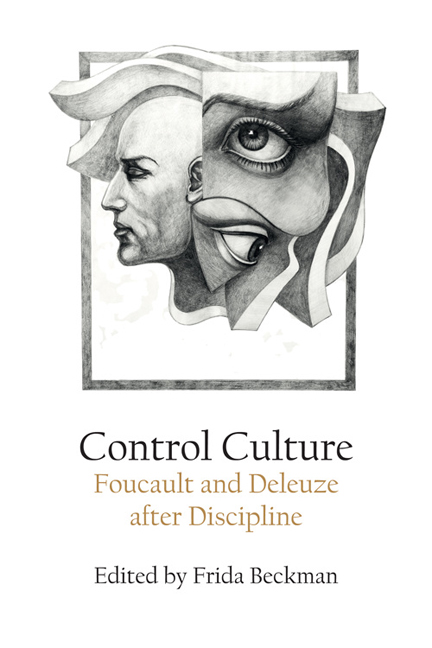Book contents
- Frontmatter
- Contents
- Acknowledgements
- Notes on Contributors
- Introduction. Control of What?
- 1 Notes from an Investigation of ‘Control Society’
- 2 Post-Mortem on Race and Control
- 3 Periodising (with) Control
- 4 Subjects of Sovereign Control and the Art of Critique in the Early Modern Period
- 5 Posthumanism, Social Complexity and the Political: A Genealogy for Foucault’s The Birth of Biopolitics
- 6 ‘That Path is for Your Steps Alone’: Popular Music, Neoliberalism and Biopolitics
- 7 Cinema in the Age of Control
- 8 Towards a ‘Minor’ Fascism: Panoptic Control and Resistant Multiplicity in TV’s Spooks
- 9 Species States: Animal Control in Phil Klay’s ‘Redeployment’
- 10 Control and a Minor Literature
- 11 Philosophy and Control
- Index
6 - ‘That Path is for Your Steps Alone’: Popular Music, Neoliberalism and Biopolitics
Published online by Cambridge University Press: 05 May 2021
- Frontmatter
- Contents
- Acknowledgements
- Notes on Contributors
- Introduction. Control of What?
- 1 Notes from an Investigation of ‘Control Society’
- 2 Post-Mortem on Race and Control
- 3 Periodising (with) Control
- 4 Subjects of Sovereign Control and the Art of Critique in the Early Modern Period
- 5 Posthumanism, Social Complexity and the Political: A Genealogy for Foucault’s The Birth of Biopolitics
- 6 ‘That Path is for Your Steps Alone’: Popular Music, Neoliberalism and Biopolitics
- 7 Cinema in the Age of Control
- 8 Towards a ‘Minor’ Fascism: Panoptic Control and Resistant Multiplicity in TV’s Spooks
- 9 Species States: Animal Control in Phil Klay’s ‘Redeployment’
- 10 Control and a Minor Literature
- 11 Philosophy and Control
- Index
Summary
Gilles Deleuze's ‘Postscript on the Societies of Control’ is short, and as the amount of scholarship dedicated to unpacking ‘the control society’ attests, the essay is highly overdetermined – which is to say, there's a lot of different ways to read and deploy it. And by the time the reader finishes perusing the present volume, he or she will surely have seen a lot of exegetical work done on Deleuze's essay. So rather than do extended hermeneutic work on the essay itself, I’m going to shift focus somewhat and delve into a specific cultural formation (the roles of popular music) within our contemporary control society. But as a kind of preface, let me just briefly lay out a few axiomatic things that I’m going to be taking out of Deleuze's ‘Societies of Control’ provocation; and by axiomatic I simply mean that I’m going to take these principles for granted, rather than arguing for them and deriving them from within Deleuze's work.
First, I’m going to take it for granted that the Deleuze's ‘control society’ is an attempt to translate Michel Foucault's sense of ‘biopolitics’ – which is to say, they’re both attempts to diagnose the present (or at least the present that's emerging in the mid-1980s to early 1990s); and even more specifically they’re both trying to give a name to a form of power that succeeds the Fordist disciplinary society of the mid-twentieth century in the West. If biopower is Foucault's name for the form that emerges after the reign of disciplinary power, Deleuze translates that emergence of biopolitical society as a shift towards ‘societies of control, which are in the process of replacing disciplinary societies’ (Deleuze 1992: 5).
The second thing I’m going to take as axiomatic is that this movement from a socius saturated by discipline to a society of biopolitics or control likewise heralds a mutation in capitalism, from the Fordist factory capitalism of mid-century (dedicated to mass-producing objects in fixed settings), to the post-Fordist, neoliberal finance capitalism of our day (dedicated primarily to producing flexibly consuming subjects, updating their lifestyle portfolios everywhere all the time). Which is to say that money, especially the floating of currencies, is a crucial feature of the transition from discipline to biopower, from discipline to control.
- Type
- Chapter
- Information
- Control CultureFoucault and Deleuze after Discipline, pp. 101 - 120Publisher: Edinburgh University PressPrint publication year: 2018

